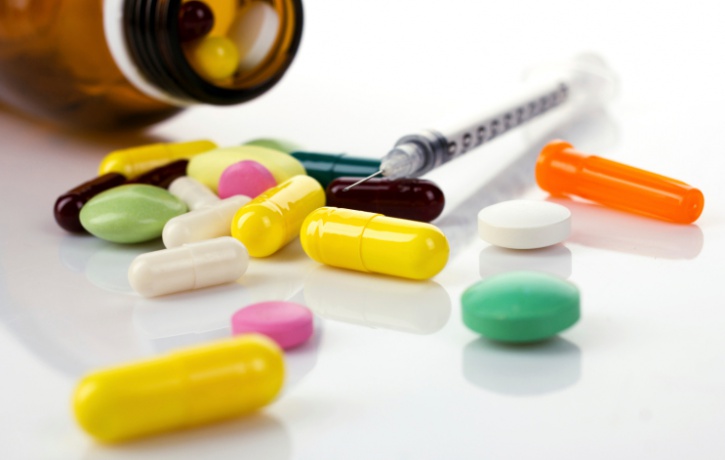 There's a lot of talking down about celebrities when they hit rock bottom due to substance abuse. But when it hits home, like it tends to do with a lot of families, how do you deal with a drug overdose and drug abuse? What are the symptoms and treatment options?
There's a lot of talking down about celebrities when they hit rock bottom due to substance abuse. But when it hits home, like it tends to do with a lot of families, how do you deal with a drug overdose and drug abuse? What are the symptoms and treatment options?
Overdosing on drugs or other types of chemicals occurs when a person takes more than a medically recommended dose, when someone is particularly sensitive to certain medications or substances, or when someone is attempting to abuse that substance to get high, either occasionally or as a result of a drug addiction. In particular, a person can overdose on illicit drugs when a person's metabolism can't detoxify the drug fast enough.
This type of overexposure is otherwise considered to be a type of poisoning - the higher the dosage, or the greater the extent of time, the more dangerous this poisoning can be.
Drug Overdose: Why?
- Drug overdoses can involve people of any age, but it is most common in very young children (from crawling age to about 5 years) and among teenagers to those in their mid-30s.
- The cause of a drug overdose is either by accidental overuse or by intentional misuse.
- Adolescents and adults are more likely to overdose on one or more drugs in order to harm themselves. Attempting to harm oneself may represent a suicide attempt.
- People who purposefully overdose on medications frequently suffer from underlying mental health conditions.
READ: Celebrities Who Died Of Drug Overdose
Drug Overdose: Symptoms To Look For
When someone overdoses on a drug, the effects may be a heightened level of the therapeutic effects seen with regular use. In addition, side effects can become more pronounced, and other effects can appear that wouldn't normally occur with normal use. Some overdoses can actually worsen a chronic disease. For example, an asthma attack or chest pains may be triggered.
During a drug overdose:
- Vital signs (temperature, pulse rate, respiratory rate, blood pressure) may increase, decrease, disappear, and/or become life threatening.
- Grogginess, mental confusion, even coma and occur.
- An additional danger is the affected person breathing vomit into the lungs and aspirating.
- Skin can be either clammy and cool, sweaty, hot or dry.
- Chest pains can occur due to heart or lung damage.
- Shortness of breath may also occur, with breathing becoming rapid, slow, deep or shallow.
- Abdominal pain, nausea, vomiting, and diarrhea are possible. Vomiting blood, or blood in bowel movements, can be life threatening.
- Organ damage can also occur, depending on the particular drug type.
Drug Overdose: What To Do First
A doctor, emergency room or local poison center may be able to help determine the seriousness of a suspected drug overdose. Development of any symptoms after drug overdose requires immediate and accurate information about the specific name of the drug, the amount of the drug ingested, and the time when the drug was taken. Often, the bottle the drug came in will have the information needed.
The most important steps you need to take include:
-
- Call 911. If you can't call someone, take the overdosed person as quickly as possible to the nearest emergency room.
- Be aware of the fact that people respond differently to drug overdoses, regardless of the seriousness of the situation. Some people will appear to be very ill, while others will show milder, less serious-seeming symptoms.
- A person unwilling to go to the hospital may need persuasion by trained professionals in emergency medical services (paramedics and ambulance personnel) or the law enforcement community. Family members are also often helpful in persuading the person to seek medical care.
- Anyone who is with a person who overdoses on drugs can assist by finding all medication or chemical containers and bringing them to the emergency room.
- Additionally, information about the time of the overdose, the amount, and underlying medical problems will be helpful to the medical staff in determining what treatment options should be considered.
READ: The Alarming Abuse Of Prescription Drugs
Drug Overdose: What To Do Next
Treatment in the case of drug overdose will be determined by the specific drug taken, as well as the amount consumed.
- The stomach may be washed out by gastric lavage (stomach pumping) to mechanically remove unabsorbed drugs from the stomach
- Activated charcoal may be given to help bind drugs and keep them in the stomach and intestines. This reduces the amount absorbed into the blood. The drug, bound to the charcoal, is then expelled in the stool. Often, a cathartic is given with the charcoal so that the person more quickly evacuates stool from his or her bowels.
- The person may have to be intubated (have a tube placed in the airway) so that the doctor can protect the lungs or help the person breathe during the detoxification process.
- Other medicine may need to be given either to serve as an antidote to reverse the effects of what was taken or to prevent even more harm from the drug that was initially taken. The doctor will decide if treatment needs to include additional medicines.
- Agitated or violent people need physical restraint and sometimes sedating medications in the emergency department until the effects of the drugs wear off. This can be disturbing for a person to experience and for family members to witness.
Home Treatment
Home care should only be considered after consulting with a doctor or a poison expert, because of the potential for serious problems after particular overdoses.
- For some accidental drug overdoses, the local poison control center may recommend home therapy and observation.
- People who take a drug overdose in an attempt to harm themselves generally require psychiatric intervention in addition to poison management. The abuser of illicit drugs should also be considered for a mental health evaluation. Finding a support group for a psychiatric or substance abuse problem can be very helpful.
- Everyone who suffers an overdose needs to be seen by a doctor for a follow-up. In part this is to ensure that there are no delayed injuries to any organ system. It is also to make sure that prevention against a recurrence is in place.
- For children, the experience of being treated for an overdose may have been frightening, and they may need help coping with the trauma as well as learning from the mistake. Following up with their pediatrician can reduce anxiety.
- Never point fingers or assign guilt.









